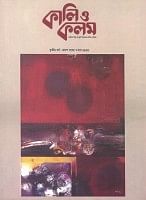Journal Review
Kali O Kolom January 2007
In the silences of receding winter
Syed Badrul Ahsan
There is a piece you ought not to miss reading in the January 2007 issue of Kali O Kolom. It is the enlightening write-up on Father Marino Rigon. In the manner of many other missionaries who made it their business to travel to these parts, all imbued by the spirit of Christianity, Father Rigon chanced upon Bangladesh, liked what he saw and decided to stay on. But that was certainly not all. He took from Bengal inasmuch as he gave to it. He learnt the language, indeed mastered it, and bravely ventured into translations of Tagore, Saratchandra, Jasimuddin and Lalon. It is on Lalon that Abul Ahsan Chowdhury engages the man of God-cum-man of letters in his write-up. You cannot put it down until you have digested all of it.That is by no means the end of one's reading. The recently deceased poet, novelist and Communist Party worker Ghulam Quddus has a niche in this issue, a truly deserved one. The commitment Quddus brought to life and politics and of course to the world of literature is appreciably highlighted through the tribute Shaheed Iqbal pays him. And complementing the experience is the remembrance of the late artiste Bikash Bhattacharya. Abul Mansur does a good job of reinforcing our collective hold on the cultural traditions Bengalis have based their thoughts on. Perhaps one of the most focused of articles here is Chetonaprobaho Shilpashaily O Chander Omovashya, where Ahmed Mowla dwells at length on the stream-of-consciousness technique employed by Syed Waliulah in his works. In the process, Mowla plunges, to readers' delight, into a rather broad account of the genre as it came to define the works of literary figures such as Albert Camus, Virginia Woolf and William Faulkner. For the student of literature, the article ought to be prized reading. That the world of literature and aesthetics is one that has expansiveness as its goal comes through lucidly in this issue of Kali O Kolom. One point of reference is Rafiq Kaiser's exhaustive Banglar Mati Banglar Jal. Bengal's division in 1905 and subsequent reunification in 1911 are an essential component of Bengali history, presaging the final partition of 1947, and one that decisively changed the political structure of the subcontinent. Kaiser's essay is a journey through that dramatic and sorry stage of our history. But rising above the narration is the unspoken sentiment, that the cultural indivisibility of Bengalis is all. There is more. Rashid Askari's reflections on postmodernism, for instance. Haider Ali Khan's informative write-up on haiku will take hold of your poetic soul. The icing on the cake, if one could call it that, is Sarkar Masud's musings on the recently departed Shamsur Rahman. This issue of Kali O Kolom ought to be gone through in the silences of a receding winter. The enjoyment will be that much deeper, that much soulful. Syed Badrul Ahsan is Editor, Current Affairs, The Daily Star.
|

|